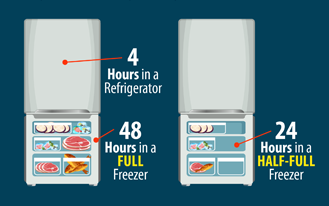More than 169,000 people in the Columbus region alone lost power on Tuesday, and American Electric Electricity estimates that power may not be fully restored in parts of central Ohio until late Thursday night. Perishables in the fridge and freezer will spoil if the power goes out, and they may still be unsafe to consume even if it is restored.
When the electricity goes out, how long will the food in the refrigerator last?
The Centers for Disease Control and Prevention (CDC) advises storing appliance thermometers in the fridge and freezer to assist in minimising food spoilage in the case of a power loss. Refrigerator temperatures should be maintained at or below 40 degrees Fahrenheit, and freezer temperatures at or below 0 degrees Fahrenheit. The Centers for Disease Control and Prevention advises that, in the event of a power loss, doors of refrigerators and freezers be kept locked. Closed refrigerators and freezers can keep food safe for up to 48 hours, while a half-full freezer can keep food safe for up to 24 hours.
Perishable items that need to be refrigerated should be stored in a cooler with ice if the power has been off for more than four hours. To maintain a temperature of 40 degrees Fahrenheit or below, ice or a cold source like frozen gel packs should be added. Here’s what you can do to check if your food is still safe to eat once the electricity has been restored.
Examine the temperature with a thermometer if you own the necessary appliances. To safely re-freeze food, the freezer must be at or below 40 degrees Fahrenheit.
Do not rely on sight or smell to judge whether or not food is safe if you do not have a thermometer; instead, open each box and take the temperature. Safe temperatures for reheating or cooking are below 40 degrees Fahrenheit or ice crystals may be seen in the meal. Refrigerator food should be fine if the power goes off for more than four hours, as long as the doors are kept closed. After the power has been restored, you should check the fridge’s temperature and throw out any leftovers or meat, poultry, shellfish, milk, eggs, or other perishables that have been sitting at or above 40 degrees Fahrenheit for more than four hours.
The Centers for Disease Control and Prevention advises that perishable foods stored at temperatures of 45 degrees Fahrenheit or lower be cooked and consumed as soon as possible. In spite of proper cooking, consuming perishable food that has not been kept cold enough might make you sick. You may store milk in the freezer for up to 48 hours, provided there is enough room. The rationale for this is that keeping things in close proximity helps to keep the cold in. You won’t get more than 24 hours out of the milk before it spoils if your freezer is less than half filled.
That’s a good rule of thumb to follow, and you should always err on the side of caution. Of course, if you have access to dry ice or a milk cooler, you might potentially significantly lengthen its useful life. Generally speaking, milk’s shelf life is half for every five degrees over 40 degrees that the temperature rises. Being ready for anything is a good idea.

